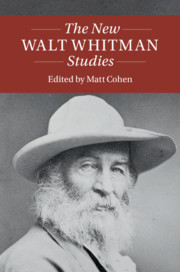Book contents
- The New Walt Whitman Studies
- Twenty-First-Century Critical Revisions
- The New Walt Whitman Studies
- Copyright page
- Contents
- Figures
- Contributors
- Acknowledgments
- Introduction
- Part I The New Life of the New Forms: Aesthetics, Disciplines, Politics
- Part II Wet Paper Between Us: New Reading Methods
- Chapter 6 Whitman in Your Pocket: The History of the Book and the History of Sexuality
- Chapter 7 “All Thy Wide Geographies”: Reading Whitman’s Epistolary Database
- Chapter 8 Haptic Feelings
- Chapter 9 Walt Whitman’s Leaves
- Part III A Kosmos: The Critical Imagination
- Index
Chapter 7 - “All Thy Wide Geographies”: Reading Whitman’s Epistolary Database
from Part II - Wet Paper Between Us: New Reading Methods
Published online by Cambridge University Press: 03 November 2019
- The New Walt Whitman Studies
- Twenty-First-Century Critical Revisions
- The New Walt Whitman Studies
- Copyright page
- Contents
- Figures
- Contributors
- Acknowledgments
- Introduction
- Part I The New Life of the New Forms: Aesthetics, Disciplines, Politics
- Part II Wet Paper Between Us: New Reading Methods
- Chapter 6 Whitman in Your Pocket: The History of the Book and the History of Sexuality
- Chapter 7 “All Thy Wide Geographies”: Reading Whitman’s Epistolary Database
- Chapter 8 Haptic Feelings
- Chapter 9 Walt Whitman’s Leaves
- Part III A Kosmos: The Critical Imagination
- Index
Summary
Focusing on a pocket-size edition of Whitman’s poems from the early twentieth century provides an opportunity for thinking about what happens to poems we think we know well when they’re read in different published contexts. Building on the central insight from book historical studies about the inextricability of publication form and literary content, this chapter also engages aspects of the history of sexuality that likewise take shape through the practices of reading and writing. The Little Blue Book edition at this chapter’s heart juxtaposes Whitman’s poems with the writings of another figure in the long US history of sexual liberation: feminist and birth-control advocate Margaret Sanger. Reading Whitman alongside Sanger as the edition urges us to do uncovers unexpected intersections, and sometimes contradictions, at the sites of gender normativity, progressive political reform, and socialism, as well as the backlash against the progressive reforms to which Whitman and Sanger dedicated themselves.
Keywords
- Type
- Chapter
- Information
- The New Walt Whitman Studies , pp. 121 - 143Publisher: Cambridge University PressPrint publication year: 2019

